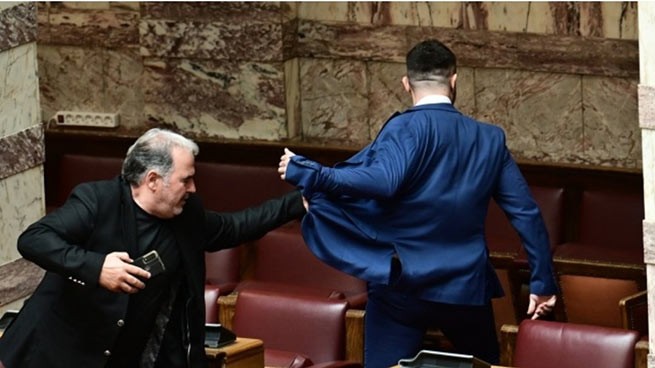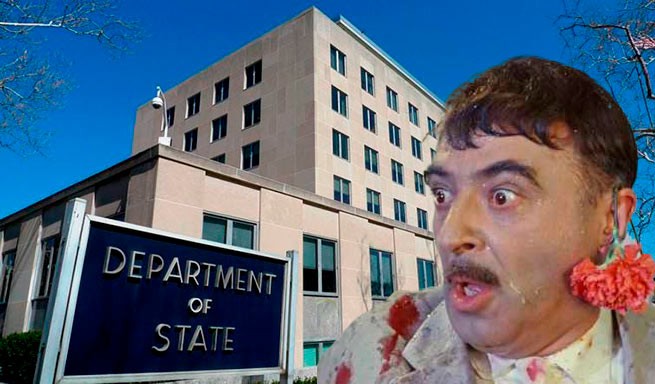Yannis Valinakis – Professor, President of the Jean Monnet European Center of Excellence at the University of Athens and former Deputy Minister of Foreign Affairs – expressed on the pages of the English version of Kathimerini’s publication his point of view on the role of Greece in the war between Ukraine and Russia.
According to most analysts, we are only a few weeks away from a Russian invasion of Ukraine, unless the West fully agrees to Vladimir Putin’s ultimatum, which is very unlikely. The war for high technology will inevitably have important and perhaps historic consequences on a global scale. There are also many representatives of the Greek diaspora in the zones of potential conflicts. What is at stake in this Ukrainian crisis is basically a system of solidarity and Western contributions as it faces the use of violence in Europe. Seen from this perspective, it can also indirectly create opportunities and pitfalls in Greek-Turkish relations. What do the ultimatums of Putin and Recep Tayyip Erdogan have in common with death threats?
It is widely believed that the Russian leader is not bluffing, and most of the controversy centers on the scope of his plans or the tools used to carry them out. Russia’s strategic goal is considered to be its international recognition as an equal partner in the new European security system – in contrast to its former role as a defeated “outcast” that the West imposed on it after the end of the Cold War. The crisis seems to highlight the unwillingness or inability of the United States to deter or even respond effectively to the use of force, even if directed against a non-Alliance country.
Ahead of a possible adjustment in the balance of power in Europe, Greece must be flexible in its actions and act on its own interests. So far, the restrained public discourse regarding our position on Ukraine and its possible ramifications points to a wait-and-see attitude. However, circumstances call for immediate “acrobatic” maneuvers, weaving between allied commitments, European deterrence, and the traditionally important relationship with Moscow. The most common analytical structure focuses on the role of the new US bases in Alexandroupoli, which, while improving the image of Greece in the US, significantly irritate Russia.
At the same time, this situation created the right conditions for the possibility of establishing mutual support (primarily from the countries of Eastern Europe and Scandinavia), as a prerequisite against all threats from any aggressive neighbor. Therefore, we must use this rare set of circumstances (parallel to the Franco-Hellenic quest for European strategic autonomy, the Strategic Compass and others) to achieve one goal: a clear and effective guarantee of mutual support against all forms of external attack. Security must be indivisible – for all Member States and along the entire length of the external border of the European Union. Any statement, contribution or sanction that we collectively formulate now must be linked within this framework to an equivalent solidarity in deterrence, sanctions and mutual defense towards Turkey.
The most appropriate manifestation of our central position on this issue may be a symbolic contribution, if asked, to help Bulgaria. A wise demonstration of solidarity could be a mission to the Bulgarian coast of ships of the Greek Navy, which will also be ready, if necessary, to evacuate the Greek community of Ukraine by sea. If it comes to open conflict, the region’s large Greek community (between 100,000 and 200,000 people in the Donbass and Mariupol coastal zone) is likely to be caught in the crossfire.
Above all, our common approach should be to delve into the international precedents that will be created by open conflict and Western opposition to armed invaders, regardless of specific differences or national affiliations. It is necessary to take into account Erdogan’s disturbing tendency to emulate the modus operandi of his Russian counterpart. Both leaders believe that the ongoing transition from a unipolar to a multipolar world creates new opportunities for them. That is why they have invested heavily in their country’s military power, especially against weaker states. After all, they both lean toward autocracy and treat the West as arrogant, loud, and ultimately soft. They are confident that he will back down in the face of any threatening ultimatums and avoid any military response to an invasion.
Both believe that the combination of circumstances is favorable, and believe that they can win big, with only a small risk. They deliberately put forward excessive demands, counting on the fact that a possible rejection of their demands will open the way for an armed invasion in their interests. The victor on the battlefield fully imposes his onerous conditions. Their strategic goals are even more destabilizing. They want to rebuild their “empires” (Soviet Union/Ottoman Empire) that their predecessors had to put up with. Both of them are itching (because of the impending election threat) to complete their supposed apparent destiny, they are both desperate for immediate “results”.
As far as Hellenism (Greece and Cyprus) is concerned, Erdogan’s tendency to emulate Putin adds an entirely different dimension to the precedent set by the Ukrainian crisis and should be considered in detail. Despite their obvious differences, the similarities between Russia’s and Erdogan’s ultimatums on Greece and the Republic of Cyprus are particularly troubling.
Every crisis, by its very nature, creates dangers but also opportunities. He rewards those who take precautions and have a plan, and punishes those who rely on improvisation. By carefully drawing the right conclusions and acting with ambitious prudence and precautionary planning, we will advance our national interests resolutely.






More Stories
Poll: which European countries are ready to defend their homeland to the last
K. Mitsotakis announced readiness for the fire season
Greece must transfer the Patriot PAC-3 system to Ukraine with US “guarantees” against the Turkish threat